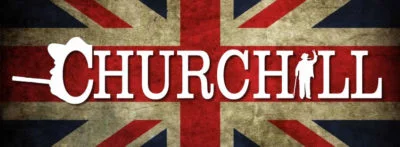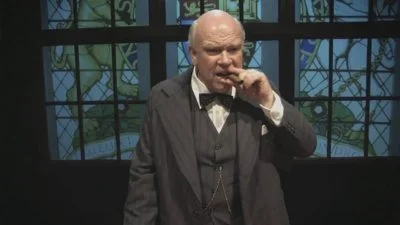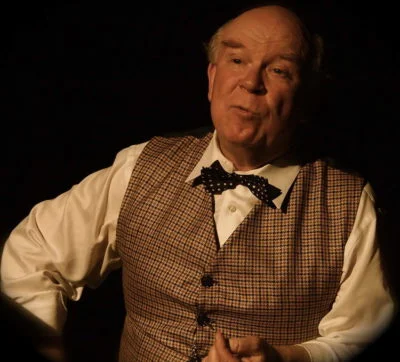Churchill (2015)
Adapted and Performed by Ronald Keaton
Based on the teleplay “Winston Churchill” by James Humes
Directed by Kurt Johns
Produced by SoloChicago and the Greenhouse Theater
The Making of a Hero in WWII Nostalgia
It was a few weeks shy of a year ago that Ronald Keaton opened his one-man show Churchill at the Greenhouse Theater, as part of his professional renaissance and the creation of a new company, SoloChicago, which he hoped he could use to provide the same opportunities for others. SoloChicago is a collaboration with the Greenhouse Theater that facilitates one-person shows, which Keaton says are a method through which struggling actors may create their own employment and find artistic fulfillment. Churchill certainly starts his project off well. After a run off-Broadway, the wildly popular show has returned to Chicago, in anticipation of another long run. In the role he wrote mostly by compiling Winston Churchill’s own quotes, and under the direction of Kurt Johns, Keaton is incorrigible, passionate, and deeply moving, as he tracks his subject’s life up until 1946, on the eve of the famous speech in which he coined the phrase “iron curtain.”

However, this is a two-act play, and Churchill does not become prime minister until the end of the first act. Before that, he regales us with how his childhood and early career prepared him for the role of civilization’s savior. It was not a happy process. From the way he tells it, his parents didn’t love him very much, and he was pushed into the military due to their belief he was unfit for anything else people of his station (sons of younger sons of dukes) typically practiced. But, he was clever, and exploited his service battling in the colonies to raise funds and name recognition by writing correspondence pieces. Eventually, he rose to become a Member of Parliament and First Lord of the Admiralty, but his career suffered a major set-back due to the Gallipoli campaign, which he feels very bad about, though insists was not his fault. Churchill’s early life tends not to be focused on much in most adaptations, so Keaton was interested in humanizing him by exploring his frailties and growth.
Keaton also throws in some of Churchill’s most famous one-liners, and snippets of his great speeches in the lead-up to the war, when his bellicosity made him stand out against the appeasers in his party. While Britain was still reeling from war and reluctant to fight another of even greater devastation, Churchill recognized Hitler as a dire menace to freedom and rationality all over the world, and swore to fight him to the last, regardless of whether anyone else approved, because he knew he was in the right. Of course, Churchill said the same thing about Gandhi. The story of the Conservative prime minister and leader of the Conservative Party for fifteen years, told from his own point of view, has a rather conservative slant. Keaton, who is very well-educated and aware of the folly of imperialism (listen to Tom Williams’s podcast interview), mentions that as a member of the Liberal Party, Churchill was instrumental in the creation of Britain’s welfare state. But the colonies are only mentioned here in the context of Churchill’s youthful exploits. Since the faction that most frequently raises Churchill’s ghost today is the neo-conservatives, who use his final admonishment to “never give up” to mean that all treaties and agreements are exactly like the Munich appeasement, and that America should take over the British Empire’s role of global leadership/domination, I found the use of these slogans at the play’s end jarring instead of inspiring. Keaton couldn’t possibly stuff Churchill’s entire career into one play, and isn’t responsible for how others have abused his subject’s legacy, but by mostly leaving out Churchill’s dark side, his humanization of the icon is still quite adoring.
 However, he accomplishes that adulation very well. Many times during the night, Churchill is tearful and vulnerable, particularly when discussing his friendship with Franklin Roosevelt. These are the best moments in the show; even at his most distressed, Churchill, who overcame a childhood stutter, eulogizes eloquently, and Keaton conveys his emotions intimately to the entire room. Elsewhere, the prime minister is charming in his wit, enthusiasm, and cordiality, making you feel like the real man is actually sitting a few feet away, wanting to be your friend. He really is quite funny when he means to be, and Keaton even pulls off some of his stirring calls to arms against the Nazis, in spine-tingling fashion. He is aided by Jeffery Epperson’s set and Paul Deziel’s projections, which contribute definite images to this memory play, providing a window into Churchill’s mind while he crafts the story of his life to make an impression on us.
However, he accomplishes that adulation very well. Many times during the night, Churchill is tearful and vulnerable, particularly when discussing his friendship with Franklin Roosevelt. These are the best moments in the show; even at his most distressed, Churchill, who overcame a childhood stutter, eulogizes eloquently, and Keaton conveys his emotions intimately to the entire room. Elsewhere, the prime minister is charming in his wit, enthusiasm, and cordiality, making you feel like the real man is actually sitting a few feet away, wanting to be your friend. He really is quite funny when he means to be, and Keaton even pulls off some of his stirring calls to arms against the Nazis, in spine-tingling fashion. He is aided by Jeffery Epperson’s set and Paul Deziel’s projections, which contribute definite images to this memory play, providing a window into Churchill’s mind while he crafts the story of his life to make an impression on us.
Keaton is a man of great charm and professional accomplishment. His two-hour long performance is a magnificent display of acting, and his director, Kurt Johns, guides him almost seamlessly through subjects as weighty as war to the mundane joys of painting. Members of the audience I saw sat riveted through Churchill’s tale of leading Britain’s resistance to the Nazis, and fully accepted Keaton in his place as a savior, and the one who called the United States to its moral awakening from isolationism. The success this show has already enjoyed demonstrates there is an appetite for World War II nostalgia, and Churchill serves it up with aplomb. Even skeptical as I am of Churchill-worship, Keaton’s re-enactments of his steadfast speeches in defense of liberty made me misty-eyed for a second. I certainly hope to see more of Ron Keaton, and of SoloChicago. There’s a lot more material for docudramas still to mine.
Highly Recommended
Jacob Davis
[email protected]
Reviewed July 22, 2015
For more information, see Churchill’s page on Theatre in Chicago, and listen to Tom Williams’s interview with Ronald Keaton from August 2014.
Playing at the Greenhouse Theater, 2257 N Lincoln Ave, Chicago. Tickets are $42-49, to order, call 773-404-7336 or visit greenhousetheater.org. Playing Wednesdays at 2:00 pm and 7:00 pm, Thursdays and Fridays at 8:00 pm, Saturdays at 3:00 pm and 8:00 pm, and Sundays at 3:00 pm through September 18. Running time is two hours, with one intermission.
